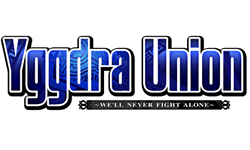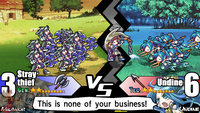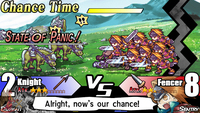|
|

|
PLATFORM
|
PSP
|
BATTLE SYSTEM
|

|
INTERACTION
|

|
ORIGINALITY
|

|
STORY
|

|
MUSIC & SOUND
|

|
VISUALS
|

|
CHALLENGE
|
Hard
|
LENGTH
|
20-40 Hours
|
|
OVERALL

|
+ Unique tactical experience
+ Lots of cards and characters
+ Adjustable difficulty if too hard
- Learning curve can be overwhelming
- Presentation decent, but still limited
- Lots of restarted battles
|
Click here for scoring definitions
|
|
|
Yggdra Union: We'll Never Fight Alone was first released in 2006 for the Game Boy Advance, right near the end of the system's life cycle. It was a unique tactical RPG with a card-based system used in combat, but due to the timing of its release, it was missed by many people. Thankfully for gamers that missed the GBA version, Atlus decided to bring Sting's PSP rendition of Yggdra Union to North America. With new features and a toned down difficulty level, this release looked to appeal to a wider audience and to give a new experience to those that played the first version.
The strongest and most original aspect of Yggdra Union is its combat system. It combines tactical turn-based gameplay with a card-based system. At the beginning of each battle, players have to select their units from a variety of characters. After those have been selected, the next step is to pick which cards to use. These cards each have a move rating, power level, skill, and ace type. The ace type lists which weapon a playable character must be using in order for the skill on the card to be available. Once those decisions have been made, the player jumps into combat.
 I will prevail.
I will prevail.
|
|
Like most tactical RPGs, battle takes place on a grid. Each square represents a specific type of terrain such as water, sand, or grass, and certain unit types can manage each of these terrain types with varying levels of success. At the beginning of each phase, a card must be selected and then players can move their units. Players and enemies each have their own phase, with each only being able to initiate an attack once per turn. The units on screen represent a union of characters, each headed by one of the playable characters, and the positioning of these units on the field can allow for more than the lead union to attack during a turn. When unions battle, it is team versus team, not one on one. Each type of unit has others that they are strong against and those they are weak against, though skills can occasionally offset weaknesses. As the actual engagement begins, players can opt to move into passive or aggressive mode. Filling up the aggression bar will allow a unit to use a skill if the ace type of the card is compatible. If one unit performs a critical hit during its initial charge, it will disable the other's leader blocking that union's ability to use skills during the rest of the turn. Battles can take a while to play out, but the PSP version has added a fast-forward option that speeds up combat significantly. Once the game has been beaten, an even faster speed is made available for secondary playthroughs.
When battle is over, the victor's card power level will determine how much damage is done to the loser's life points, known here as morale. When morale is depleted, the union is out of commission for that round. Morale is not recovered between rounds for unions that were active in the battle before, but if a group was not in the fight, they will recover morale automatically. Items that recover morale can be used during the break between combat, helping units be at full strength for the next round. Other limited use items can be equipped by leaders to help boost their stats. The overwhelming aspects of combat can create a rather steep learning curve, but once that is overcome, things are very manageable.
 Yup, you're screwed.
Yup, you're screwed.
|
|
The story of Yggdra Union is secondary to combat, but is still fairly solid. Players follow the adventures of Princess Yggdra as she attempts to avenge her parents and reclaim her kingdom from the evil empire that has declared war on it. The plot is very well written, though characters are not developed very strongly. Princess Yggdra is a slight exception to this rule, but even she is not detailed extremely well. It is a tale of revenge and justice, and it brings up some moral issues that are often associated with war. There are some interesting twists and turns in the story that bring it up to par with other titles.
Yggdra Union's presentation has been upgraded to take advantage of the PSP's capabilities. Voice acting has been added to this version and all of the actor's do a solid job of delivering their lines. While the soundtrack is the same as the one included with the GBA version, things sound clearer over the PSP's speakers. The graphical aspects are also very sharp in terms of character portraits, but the battlefield environments have changed little since the GBA release. Most of the game's visual presentation takes place via character headshots with accompanying dialogue meaning there are no real-time animations. Actual combat graphics are crisp and artistically impressive, even if these are also limited.
The biggest challenge of Yggdra Union is actually learning how to play the game. Once players have a solid grasp of combat, the game becomes more fun and is no longer a frustrating experience. If a battle just isn't going in a positive direction and the player loses, two options are made available: restarting the map at a lower difficulty or starting over from a prior save. The bonus stats that are offered after a successful battle are lost if the player decides to restart the map in an easier mode, but if the battle is just too difficult; it at least makes the game playable.
Yggdra will take most players around twenty-five hours or more to complete, though that can vary depending on how many times battles are repeated. This is a solid example of a game that missed its opportunity to stand out and deserved a second chance. If Yggdra Union had just been directly ported to the PSP, it would have still been good game, but the improvements that Sting made to make the game more manageable have only been for the better. For those looking for a new experience in a tactical RPG, Yggdra Union is that game. For those that did tried the Game Boy Advance version, there is enough here to make it worth another shot, especially if the GBA release proved to be too difficult.
Review Archives
|









